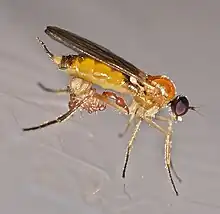攜播
攜播[1](),亦作便乘性[2],是生態學的一個名詞,指一種在物種間的互動共生關係。 當中一種生物會通过另一生物进行機動式的传播和扩散。 這種關係算是一種偏利共生關係,雖則在生理學上兩個物種並沒有從屬關係。
例子
在节肢动物與樹懶之間的就保持着一種攜播關係:食糞的螟蛾科物種諸如Bradipodicola hahneli及Cryptoses choloepi的特殊之處,在於牠們只會在一種只生活於中南美洲的一類哺乳綱物種樹懶的毛上棲息[3][4]。當中,樹懶為飛蛾提供運輸,雌蛾在樹懶的糞便中排卵 ,幼蟲在它上面飼養,新孵化的飛蛾進入森林樹冠尋找新的樹懶寄主。
其他例子還有:
參考文獻
- 胡敦孝; 沈佐銳. . 昆蟲知識: 91–94. doi:10.3969/j.issn.0452-8255.2001.02.003 (中文(简体)).
- 《シロアリの事典》在Google Books的內容。
- Sherman, Lee. (PDF). Terra, Spring 2008. Oregon State University. [14 February 2011]. (原始内容 (PDF)存档于2016-03-03).
- Rau, P. . Annals of the Entomological Society of America. 1941, 34: 355–366(12) [14 February 2011]. (原始内容存档于2014-10-12).
- Torrini, Giulia; Strangi, Agostino; Paoli, Francesco; Binazzi, Francesco; Camerota, Manuela; Pennacchio, Fabrizio; Roversi, Pio F. [在松樹上發現的一種新的攜播關係:Bursaphelenchus minutus (線蟲門: Parasitaphelenchidae) 和 Orthotomicus erosus (Coleoptera: Scolitydae)]. Scandinavian Journal of Forest Research. 2016-11-09, 32 (6): 455–458 [2018-03-26]. doi:10.1080/02827581.2016.1254278 (英语).
參看
This article is issued from Wikipedia. The text is licensed under Creative Commons - Attribution - Sharealike. Additional terms may apply for the media files.
